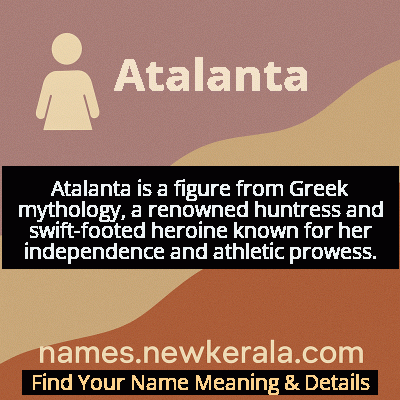Atalanta Name Meaning & Details
Origin, Popularity, Numerology Analysis & Name Meaning of Atalanta
Discover the origin, meaning, and cultural significance of the name ATALANTA. Delve into its historical roots and explore the lasting impact it has had on communities and traditions.
Name
Atalanta
Gender
Female
Origin
Greek
Lucky Number
7
Meaning of the Name - Atalanta
Atalanta is a figure from Greek mythology, a renowned huntress and swift-footed heroine known for her independence and athletic prowess.
Atalanta - Complete Numerology Analysis
Your Numerology Number
Based on Pythagorean Numerology System
Ruling Planet
Neptune (Ketu)
Positive Nature
Intuitive, analytical, spiritual, and inquisitive.
Negative Traits
Secretive, reserved, aloof, and can be overly critical.
Lucky Colours
Green, yellow.
Lucky Days
Monday.
Lucky Stones
Cat’s eye, moonstone.
Harmony Numbers
1, 5, 6.
Best Suited Professions
Scientists, researchers, spiritual leaders, detectives.
What People Like About You
Depth of knowledge, analytical skills, spirituality.
Famous People Named Atalanta
Atalanta (Mythological)
Huntress and Heroine
Legendary figure who participated in the Calydonian Boar Hunt and famously raced her suitors
Atalanta Fugger
Noblewoman and Patron
Renaissance-era aristocrat from the influential Fugger banking dynasty
Atalanta B. C.
Football Club
Prominent Italian Serie A football club with significant European competition history
Name Variations & International Equivalents
Click on blue names to explore their detailed meanings. Gray names with will be available soon.
Cultural & Historical Significance
Beyond her mythological origins, Atalanta's cultural impact extends to various artistic and literary traditions. In Renaissance Italy, her story was frequently depicted in paintings and tapestries, often emphasizing her athletic beauty and the dramatic tension of her race. The 19th century saw renewed interest in her character among Romantic poets and Pre-Raphaelite artists who found in her story themes of natural freedom versus societal constraints. In contemporary times, her name has been adopted by sports teams, literary characters, and even space missions, demonstrating the enduring appeal of her story across different cultural contexts. The Italian football club Atalanta Bergamo, founded in 1907, carries her legacy into modern sports culture, while feminist scholars continue to analyze her myth as an early example of female autonomy in Western literature.
Extended Personality Analysis
Those bearing the name Atalanta often exhibit a remarkable combination of physical vitality and intellectual sharpness, reflecting their namesake's dual nature as both huntress and strategic thinker. They typically demonstrate exceptional determination and resilience, capable of pursuing long-term goals with focused intensity. Like the mythological Atalanta who survived abandonment and thrived in the wilderness, modern Atalantas often show remarkable adaptability and self-sufficiency. Their competitive spirit is usually channeled into constructive endeavors, whether in sports, academics, or professional pursuits, and they take genuine pride in achievements earned through merit and hard work. This creates individuals who are both accomplished and principled, valuing fairness and authenticity in all their interactions.
In social contexts, Atalantas often project confidence and independence that can be both inspiring and intimidating to others. They tend to form deep, meaningful relationships rather than numerous superficial ones, and value partners and friends who respect their autonomy while offering genuine emotional connection. Their strong sense of self can sometimes manifest as stubbornness or resistance to compromise, particularly when they perceive external pressures as threats to their independence. However, this same quality makes them fiercely loyal protectors of those they care about and principled advocates for causes they believe in. The mythological transformation into lions with her husband suggests that when Atalantas do commit to relationships, they bring the same intensity and protective instinct that characterizes their independent pursuits, creating powerful partnerships built on mutual respect and shared strength.
Modern Usage & Popularity
In contemporary naming practices, Atalanta occupies a distinctive niche as a powerful mythological choice that combines classical heritage with strong feminist connotations. While it remains relatively uncommon, its usage has shown gradual increase since the early 2000s, particularly among parents seeking unique names with literary and historical depth. The name finds particular favor in academic families, classical studies enthusiasts, and those drawn to names celebrating female strength and independence. Its rarity ensures distinctive identity while its mythological roots provide instant cultural credibility. In the United States, the name has never broken into the top 1000 baby names, maintaining its status as an exclusive choice that signals thoughtful naming rather than trend-following. The success of the Italian football club Atalanta Bergamo in European competitions has brought renewed attention to the name in sports contexts, while its appearance in popular fantasy literature and games has introduced it to younger generations. The name's four-syllable structure and melodic quality make it both memorable and elegant, appealing to parents looking for names that are both unusual and euphonious.
Symbolic & Spiritual Meanings
The name Atalanta carries profound symbolic weight that extends far beyond its literal Greek meaning of 'equal in weight.' It represents the eternal tension between freedom and connection, independence and intimacy, that characterizes much of human experience. The golden apples that distracted her in the race symbolize the seductive power of desire and the ways in which even the most focused individuals can be diverted from their path by appealing temptations. Her transformation into a lioness alongside Hippomenes serves as a powerful metaphor for the raw, untamable nature of authentic passion and the consequences of transgressing sacred boundaries. The huntress archetype she embodies connects to deeper psychological symbols of pursuit—whether of goals, knowledge, or self-actualization. In modern symbolic interpretation, Atalanta represents the integrated self that honors both strength and vulnerability, competition and compassion, independence and relationship. She symbolizes the journey toward wholeness that acknowledges all aspects of one's nature without denying any particular quality in service of social expectations or gender norms.

